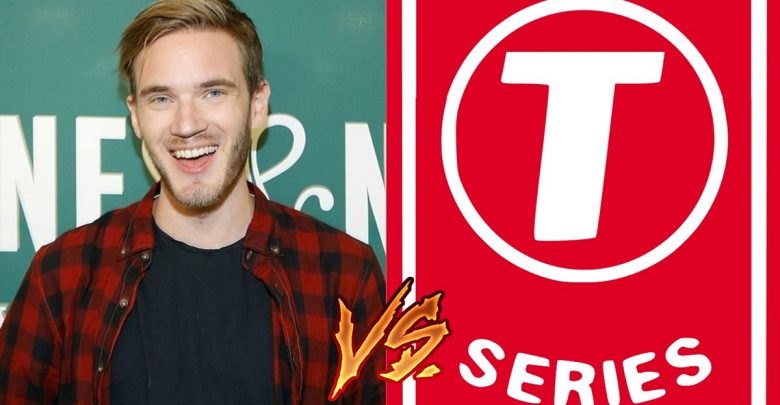Editorial: In the battle between PewDiePie and T-Series, we need a third way
Three takes on the epic YouTube war of 2018
 Calum Patterson
Calum PattersonFor years, PewDiePie has been a mainstay of the online landscape since he began uploading Let’s Play videos to YouTube in the early 2010s.
Since August 15, 2013, PewDiePie — known offline as Felix Kjellberg — has been the most subscribed channel on YouTube.
But the vlogger, creator, and gamer-in-chief is at risk of being dethroned.
Indian media company T-Series has been steadily gaining on PewDiePie for the last few months. Now the two channels are neck and neck, with each coming close to 74,000,000 subscribers.
Their battle has taken on a life of its own in the memier corners of the internet. On October 5, Pewds published “bitch lasagna,” a diss track aimed at T-Series. On October 29, renowned meme lord Grandayy posted a video featuring Voiceover Pete calling on “all nine-year-old gamers” to subscribe to PewDiePie and unsubscribe from T-Series.
Several YouTubers, both alt and normie, have posted jokes, breakdowns, and analyses of the “war,” including The Game Theorists, who declared that PewDiePie is doomed. FlareTV is streaming a live subscriber count here. Even the mainstream media have picked up on this momentous battle, with the BBC reporting on the shenanigans of Hacker Giraffe, an anonymous hacker who caused 50,000 printers to print messages urging people to subscribe to Pewds.
In fact, as I write this, Grandayy has just released “PewDiePie vs T-Series in WWE 2K19” on his YouTube channel.
The discourse surrounding the competition between these digital media giants has largely been facetious and goofy. But it also reveals different anxieties and stakes in the internet culture wars. Whose side you fall on depends, I think, on what you see the value and future of cultural production on the social internet to be.
Take One: PewDiePie the Creator Comrade vs. T-Series the International Bourgeoisie
First, there’s the pro-Pewds take.
Per this narrative, working-class hero PewDiePie is fighting to defeat a corporate behemoth. Our dear bro Felix is Ahab, and T-Series is Moby Dick.
After all, Kjellberg is a self-made man; he became a millionaire from playing video games online. His career speaks to the ripe potential of the social internet; on YouTube, anyone can gain a following and make a living doing what they love.
Media companies like T-Series threaten this democratic ideal. As YouTube pivots to support highly produced, monetized content from established media outlets, independent creators whose blood, sweat, and tears truly popularized the platform are left in the dust.
Protecting the centrality of independent creators — whether they be video essayists, musicians, or even epic gamers like PewDiePie — is a worthy cause. Keeping the crown on PewDiePie’s head is a symbolic but vital battle in this war for digital freedom.
By this story, PewDiePie is the flagbearer for independent creators everywhere, and against him, T-Series is the bastion of corporate cultural dominance.
Sticking it to corporations? Decentralizing cultural production under late capitalism? Building an internet for the common folk? That’s epic. BROFIST!
Take Two: PewDiePie the Gamer Bigot vs. T-Series the Postcolonial Revolutionaries
But hold on… PewDiePie’s no champion of the oppressed!
After all, the February 2017 “adpocalypse” that devastated the livelihoods of independent YouTubers partially resulted from his use of anti-semitic imagery in several videos, including one of a now-infamous prank wherein he paid two Indian men on the content-for-hire website Fiverr to hold up a sign with “Death to all Jews” written on it.
PewDiePie and his defenders have claimed this work is satirical and isn’t meant to promote anti-semitism. But irrespective of his intentions, this trend in Kjellberg’s content nudges bigotry further into the mainstream — his use of anti-semitic imagery, for instance, has attracted the alt-right.
In July 2016, for instance, a 4chan user posted in the infamous discussion board /pol/ (short for “politically incorrect”) praising Kjellberg for being “redpilled,” a tern in alt-right speak for being awake to the realities of mainstream culture. About a month later, neo-Nazi website The Daily Stormer published an article enthusiastically saying PewDiePie “just went full Nazi.”
Let’s also not forget that Pewds is a millionaire, primarily for sharting out lukewarm content on the daily. That doesn’t quite say “online artists’ utopia” to me.
In comparison, T-Series is looking great. It’s your one-stop shop for Bollywood-focused content, mainly uploading music videos viewed by millions of fans all over India and the Indian diaspora.
With these considerations in mind, rallying against T-Series doesn’t resemble a workers’ revolution after all. Instead, it looks like an effort to suppress international cultural influence and maintain a Eurocentric norm. To vilify T-Series — even facetiously — veers into Orientalist territory.
As the second-most populous country in the world and a Eurasian cultural centre for millennia, India’s cultural products and preferences deserve respect. The Western Anglosphere has had a monopoly on internet culture — and really, all globalized culture — for long enough.
By this story, PewDiePie is the crown prince of millionaire gamer fail son edgelords, and against him, T-Series is the rightful ambassador of the global South.
Sticking it to facetious fascists? Disrupting Western hegemony? Building an internet for a global audience? That sounds far more epic.
Take Three: Actually, they both suck.
Neither of the preceding takes captures the full story.
It’s true that T-Series is a powerful corporation, and therefore the worst. But it’s also true that PewDiePie is an odious content dumpster fire.
PewDiePie’s no comrade, T-Series no cosmopolitan champion. Like Hector and Achilles, neither channel can be our hero in this epic war.
To end this war, we’ll need our own Trojan horse. But ours won’t be filled with Hellenic warriors aiming to raze Troy. Instead, it’ll be full of independent creators and their political allies aiming to build a democratic, cosmopolitan internet.
When we meme about YouTube throwdowns like this, we need to do so through an intersectional, emancipatory lens. Only then will we hold fast to the best version of the digital dream — a dream of responsible, ethical independent creators across nations and cultures, working and collaborating on platforms that support them.
That dream, I think, is truly epic.




